R&D PROJECTS
EUROPEANS


Title: Alternative Chemicals and Materials integrating Safety, Sustainability, new Production technologies and Socio-economic aspects- AlChemiSSTS
The AlchemiSSts project will demonstrate the applicability of the Safe by Design (SSbD) framework aiming at developing and implementing safer and more sustainable alternatives to surfactants, plasticizers, and flame retardants that, being present in daily life products pose a high risk for the human health and the environment, thus considered substances of very high concern (SVHC). To this end, up to seven case studies, accounting with the relevant actors in the value chain are proposed in the project, and they will serve as proof of concept to test the SSbD framework against within its different 5 steps.
The general objective of the project will be achieved by addressing specific goals such as the development of the alternative substances itself, the compilation of robust and reliable evidence for a Proof of Concept of the SSbD framework, the development of a certification methodology promoting the implementation of the SSbD concept in the industrial network.
Another key pillar of AlchemiSSts project relies on the implementation of integrated approaches and tools to support safety, sustainability and social assessment based on interoperable FAIR data and models. In addition, robust data on sustainability indicators and information for assessing the impact of the outcomes of the project towards a suite of zero pollution targets will be delivered for each case. For all these relevant aspects, AlchemiSSts will be assisted by stakeholders to ensure social acceptance and economic of the foreseen innovative advance materials.
Proposal ID: 101178074
Call: HORIZON-CL4-2024-RESILIENCE-01
NATIONAL
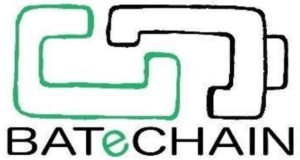
Title: Development of a battery manufacturing ecosystem for electric vehicles based on material sustainability, digitalization and industrial competitiveness.
Project objectives
The BATeCHAIN project has the overall goal of developing and validating a coordinated set of innovative technological solutions that strengthen the national value chain in the field of manufacturing components for batteries intended for electric mobility. This initiative is structured around three strategic pillars: advanced digitalisation, material sustainability, and industrial competitiveness, with a clear focus on the strategic autonomy of the automotive sector in Spain. The strategy is based on collaboration among specialised agents within the national ecosystem, promoting shared innovation and the integration of complementary industrial capabilities.
Partners: Nasika Products, S.A.U., CAAR, Convenzar, CIAC, Millor Battery, GIRA, LIS DATA SOLUTIONS, SERNAUTO, Birziplastik, FAZYL, AENIUM ENGINEERING, AEI Rioja, AVIA, Matrices Alcántara, CEAGA, ILK mobility.
Call
CALL FOR 2025 AID FOR INNOVATIVE BUSINESS GROUPS WITH THE AIM OF IMPROVING THEIR COMPETITIVENESS AND CONTRIBUTION TO STRATEGIC AUTONOMY.

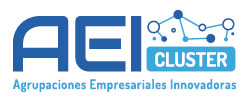

Project objectives
The project aims to replace additives currently required in the formulation of rubber soles (NR, SBR) that are candidates for classification as Substances of Very High Concern (SVHC) under European regulations (REACH).
Several additives commonly used in the elastomeric bases that make up footwear soles—such as vulcanizing agents, stabilizers, and antioxidants—are included to achieve materials with suitable performance properties (elasticity, hardness, impact resistance) for their use in the sector. Although some of these additives have been used for decades, in recent years high toxicity levels have been identified. Both the industry and regulatory bodies need to phase out their use by developing new formulations free of toxic additives while still ensuring the required performance of footwear products. In addition, these new additives must remain economically viable, as the sector cannot tolerate a significant increase in costs. Another key requirement is that production times (for example, during vulcanization) do not increase, since longer processing times would reduce productivity and lead to higher costs, energy consumption, and associated emissions.
Therefore, this project seeks to develop new rubber (elastomer) sole formulations with equal or superior performance to those currently produced, free of highly toxic additives, and to demonstrate that they are economically viable, cost-neutral, and contribute to environmental objectives.
Partners: Nasika Products, S.A.U. y Cauchos Ruiz-Alejos, S.A.U.
Call for proposals
VULCAFREE is supported by the Biodiversity Foundation of the Ministry for Ecological Transition and Demographic Challenge (MITECO) within the framework of the Recovery, Transformation and Resilience Plan (PRTR), funded by the European Union – NextGenerationEU.

Objectives of the project
The project involves the implementation of new technologies for monitoring rubber-mixing processes in order to digitally control the mixers, achieving higher production performance with a significant reduction in waste and indirect costs.
In addition, the cooling system of this equipment will be replaced with a more modern and efficient one, allowing us to reduce the amount of water used. As a result, we will be able to manufacture polymer bound dispersions for the footwear sector with a lower environmental impact and more competitive prices, positioning us advantageously in the market.
Call for proposals
DIGITOPTIMUM is supported by the Biodiversity Foundation of the Ministry for Ecological Transition and Demographic Challenge (MITECO) within the framework of the Recovery, Transformation and Resilience Plan (PRTR), funded by the European Union – NextGenerationEU.

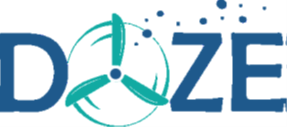
ADVANCED MANUFACTURING OF MULTIFUNCTIONAL AEROSTRUCTURES FOR ZERO-EMISSION AIRCRAFT – DOZE
Project Objectives
The DOZE project addresses the needs of the aerospace sector through the development of new composite aerostructures that are not only lightweight but also integrate new functionalities (thermal management) and are highly sustainable in terms of materials and processes. By integrating functional materials, sustainable manufacturing techniques, and advanced simulation tools, the project aims to tackle the critical challenges posed by the transition to zero-emission aircraft, laying the groundwork for the development of the next generation of aerostructures and contributing to broader sustainability and efficiency goals in air transport, while positioning Spain at the forefront of advanced technology development for the aerospace sector.
In this regard, the DOZE project contributes to Mission 7 of the 2024 “Science and Innovation Missions” call, which focuses on the “sustainability and efficiency of air transport,” through, among other efforts, the development and manufacturing of new multifunctional aerostructures that reduce aircraft weight based on new materials and advanced manufacturing processes. Furthermore, DOZE represents the beginning of a long-term strategy aimed at transforming the multimaterial aerostructure manufacturing processes for the four companies involved in the consortium. These companies represent the different key players in the project’s value chain: aerostructure manufacturers (AEROTECNIC), advanced simulation tool providers (IDAERO), and developers of functional materials and processes (SMART and NASIKA).
Call for Proposals: CDTI Science and Innovation Missions 2024
The Centre for the Development of Industrial Technology (CDTI), through the Science and Innovation Missions Program, has approved the DOZE initiative. The consortium project, in which Nasika is a participant, has been subsidized by CDTI.
The project has been funded by European Recovery and Resilience Mechanism funds and supported by the Ministry of Science, Innovation, and Universities.
Duration: 2024 – 2025 (16 months)
Socios
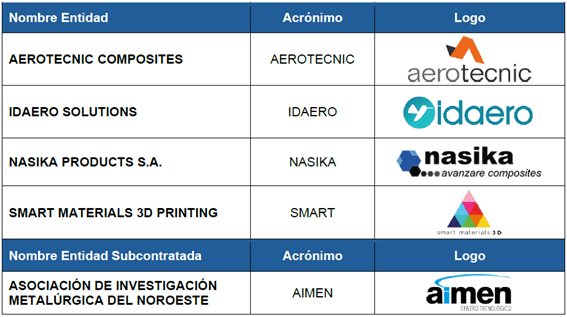


Title: Advanced technology to enhance the flexibility and resilience of distribution networks through hybrid AC/DC renewable energy microgrids, solid oxide electrolysis, fuel cells, and recyclable, sealed hydrogen storage (AD-GRHID).
With the ambition of addressing the energy transition challenges established in the PNIEC for distribution networks, AD-GRHID aims to develop, validate, and demonstrate an integrated management platform—and the underlying technology—to increase the capacity of distribution networks to host renewable energy resources by structuring them into hybrid AC/DC microgrids based on the hydrogen energy vector.
- This is a collaborative project coordinated by Magtel Operaciones, with the participation of NASIKA, H2B2 Electrolysis Technologies, Ingelectus Innovative Electrical Solutions, La Eléctrica de Villanueva de Córdoba, Premo, Protio Power, and Tequinson Servicios.
- Funded by CDTI.


- File Number: MIG-20221009
- «Missions Program for Science and Innovation»
State Program to Catalyze Innovation and Business Leadership of the State Plan for Scientific and Technical Research and Innovation 2021–2023, within the framework of the Recovery, Transformation and Resilience Plan.
Title: Optimization of productive performance through the digitalization and automation of processes, with a significant reduction of generated waste and resources used.
The project involves the implementation of new technologies for monitoring rubber mixing processes, in order to digitally control the mixers, achieving higher production performance with a significant reduction in waste and indirect costs. In addition, the cooling system of this equipment will be replaced with a more modern and efficient one, allowing us to reduce the amount of water used. As a result, we will be able to manufacture predispersed compounds for the footwear sector with a lower environmental impact and more competitive prices, achieving a stronger market position.
Call: Circular Economy in the Textile, Fashion, Apparel, and Footwear Sector. Resolution of April 8, 2024, by the Directorate of Fundación Biodiversidad F.S.P., approving the publication of the call for grants to promote the circular economy in the textile, fashion, apparel, and footwear sector, within the framework of the Recovery, Transformation and Resilience Plan for 2024.
Duration: 01/09/2024 – 31/12/2026
Partners: Nasika Products, S.A.U.
Title of the flagship project: “T.E.S.I.S. – Transformation towards Electromobility and Industrial Sustainability Stellantis”
Title of the primary project: “Research on innovative interior lighting solutions for the electric vehicle”
Beneficiary company name: NASIKA PRODUCTS, S.A.U.
File number of flagship project: VEC-010000-2022-2
PERTE for the Electric and Connected Vehicle
The project falls within Optional Block A.1 – Manufacturing of smart vehicle components, and the transversal blocks T.1 – Circular Economy Plan and T.2 – Digitalization. The project type is Industrial Research and the line is Research, Development, and Innovation.The aim of the project is to carry out research into materials and interior lighting solutions for electric vehicles that do not require metallic wiring, with low energy consumption and reduced weight. Specifically, a laser system will be used to create a conductive path integrated into the interior components of the vehicle. To make this possible, materials with high laser sensitivity will be developed for use in the manufacturing of interior vehicle components, and the component manufacturing processes will be adapted. The project also includes the development of prototypes to validate the technology, as well as recycling processes for various electric vehicle components.
- Collective project in which, in addition to NASIKA, Zeplas and Avanzare Innovación Tecnológica participate.
- Opel España (Financial support for comprehensive actions in the industrial chain of the electric and connected vehicle within the Strategic Project for the Economic Recovery and Transformation of the Electric and Connected Vehicle sector – PERTE VEC).
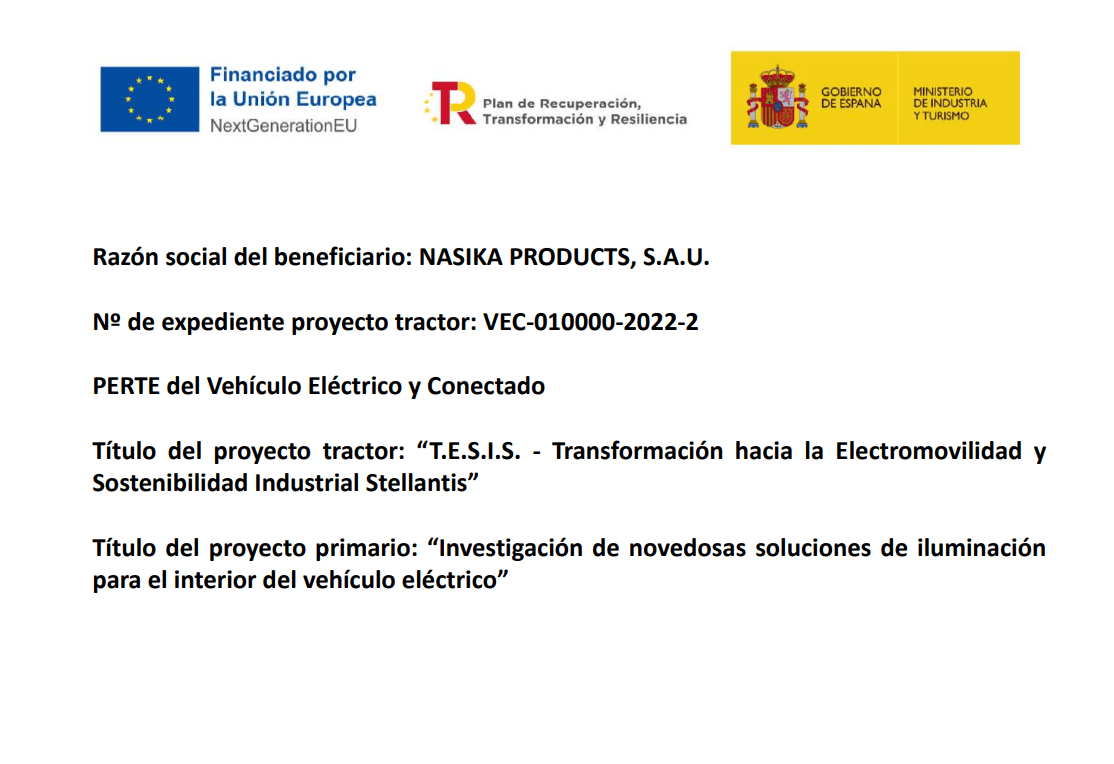
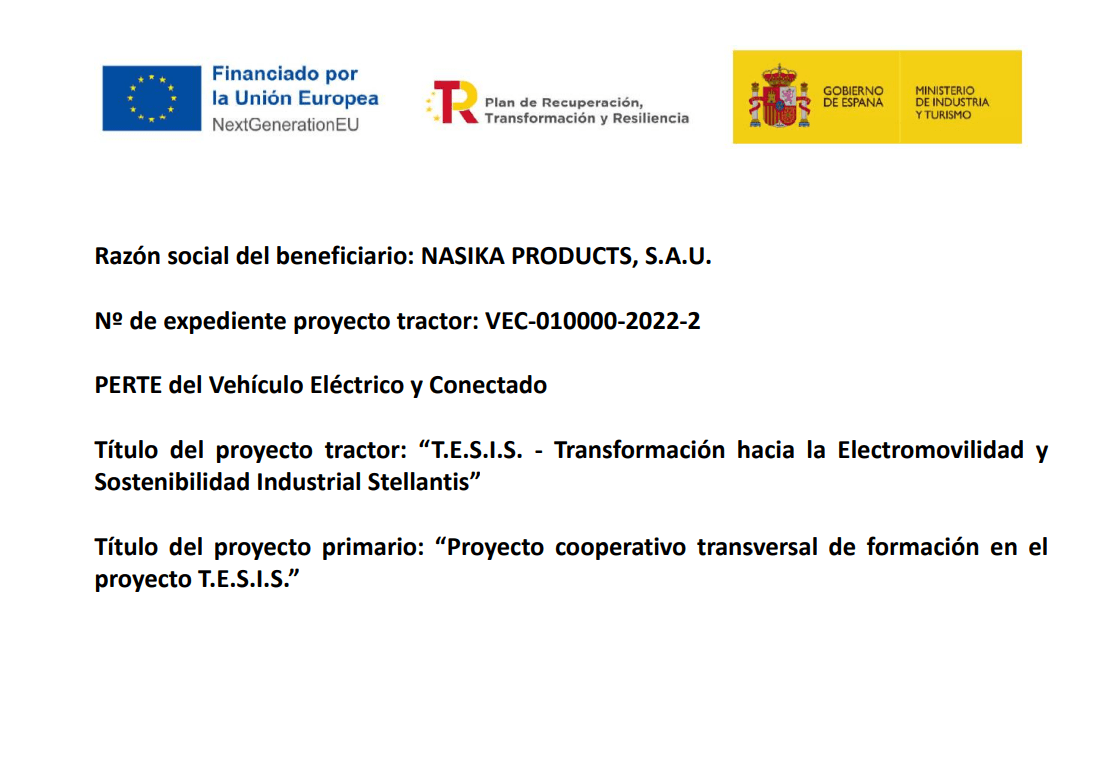
Title: Applied research into the manufacturing of new lightweight, 100% recyclable structural composites for boatbuilding.
The project focuses on applied research for the manufacturing of new composites with potential practical applications in the naval sector, designed to be fully recyclable for later reuse at the end of their service life, through the application of new chemical recycling techniques (solvolysis).
- Collective project with the participation of NASIKA, Marina Barcelona 92, Magonis Boats, Incom Composites, and Glooers Technologies.
Call: PERTE NAVAL.

File Number: PNA-020100-2023-31
Primary Project Code: PP03
Collaborative project coordinated by the Institute of Polymer Science and Technology (ICTP) of CSIC, with the participation of NASIKA, Valoriza Servicios Medioambientales, Carbochimica Institute (ICB) of CSIC, Fundación Gaiker, Institute of Catalysis and Petrochemistry (ICP) of CSIC, Arkema Química, and Repsol.Title: Enhancing circularity through the use of renewable monomers and sustainable chemical polymer recycling strategies (SUSCHEMPOL).
The main objective of this project is to increase the circularity of polymers through actions across their entire value chain, with the following specific goals:
1. Application of more sustainable chemical recycling strategies to obtain monomers and high-value molecules.
2. Synthesis of more sustainable polymers using monomers and building blocks derived from renewable resources or chemical recycling, following eco-design principles.
3. Enhance knowledge transfer from research to industry and improve societal outreach on the sustainability of plastics.
- Collaborative project coordinated by the Institute of Polymer Science and Technology (ICTP) of CSIC, with the participation of NASIKA, Valoriza Servicios Medioambientales, Carbochimica Institute (ICB) of CSIC, Fundación Gaiker, Institute of Catalysis and Petrochemistry (ICP) of CSIC, Arkema Química, and Repsol.

File Number: PLEC2021-007793
R&D&I projects in strategic areas, in public-private collaboration, under the State Program for R&D&I Oriented to Societal Challenges, within the framework of the State Plan for Scientific and Technical Research and Innovation 2017–2020.
This company has received aid co-financed by the European Regional Development Fund (ERDF) for the project involving the purchase of machinery, electrical installation, and other facilities. This project contributes to Objective OT3: Achieving a more competitive business fabric, under the ERDF Operational Program of La Rioja 2014–2020.
PROJECTS CO-FINANCED WITH ERDF FUNDS

- IFile Number:2019-P-AFI-00030
nvestments for improvements in production lines
This company has received aid financed by the European Regional Development Fund (ERDF) as part of the European Union’s response to the COVID-19 pandemic, incorporated into the ERDF Operational Program of La Rioja 2014–2020 – Priority Axis: PA20. Supporting recovery from the crisis in the context of the COVID-19 pandemic and its social consequences, and preparing a green, digital, and resilient economic recovery.
PROJECTS CO-FINANCED WITH REACT ERDF FUNDS

- LR46 – Aid for companies to carry out energy-saving and efficiency projects
File Number: 2021-I-TEC-00001
“Replacement of compressors and photovoltaic installation”
REGIONAL
Title: Development and characterization of concentrates of two-dimensional materials and their integration into polymer matrices.
Development of a new range of compounds with a high concentration of graphene-based materials (GRMs) in elastomeric matrices, providing ready-to-use concentrates for incorporation into other matrices.
- Industrial PhD NASIKA – University of La Rioja

- File Number: Industrial Doctorates in the Autonomous Community of La Rioja.
Title: Development of new polymer solutions and implementation of a new production process.
Development, adjustment, and implementation of a new industrial process for the manufacture of polymer solutions of different types in mineral oils, intended to be used as viscosity index improvers in the production of lubricating oils.
- Collaborative project coordinated by the La Rioja Automotive Cluster, with the participation of NASIKA, Industrial Química Riojana, and the Rioja Technological Center.

- File Number: 2021-I-IDI-00035
Economic Development Agency of La Rioja
Title: New methodology for the preparation of universal pre-concentrates for the thermoplastics industry.
Development of a new line of pre-concentrates for the thermoplastics sector, allowing the incorporation of minor additives without the need to create specific masterbatches for each material.
- File Number: 2021-I-IDI-00028 Economic Development Agency of La Rioja
- Individual project

